Hundreds of English Corners can be found across China, and the Renmin University gathering is by far the largest and most influential. The event draws a diverse crowd, with attendees ranging in age from five to over seventy, the majority appearing to be college students or in their twenties. The event is host to patriots, dissidents, scholars, students, and casual observers. In their own words, they have come to practice their “oral English.” The social energy is palpable.
English Corner may be the most liberated institution in Mainland China. Rules are few and there are no leaders, no organizational structure, no agenda, and no charge for entry. It is everything that a traditional Chinese classroom is not. Signposts erected by the university display the following messages in Chinese and English:
Please keep your voice levels down.
Please maintain a clean environment.
No religious activities allowed.
This lack of conventional regulation sets the stage for a curious blend of characters and motives rarely seen elsewhere in Chinese society. Public pontificating and grandstanding are entirely acceptable here. Personal questions and pointed inquiries are leveled with earnest abandon. The ever-present Chinese taboo of losing face as a result of mistakes made while speaking English seems to have vanished. The freewheeling atmosphere is simultaneously liberating and overpowering; one may speak to several dozen curious and enthusiastic conversation partners throughout the course of an evening. It can be draining to spend a couple hours in the zone as strangers and repetitive questions fly by constantly.
The phenomenon of a mass social gathering at which strangers address one another in a foreign language is a potent symbol of globalization and the wholesale international adoption of the English language. Attendees are overwhelmingly Chinese, with a few foreigners that draw disproportionate amounts of attention. Foreigners who venture into the circle are quickly surrounded by Chinese attendees, who either listen patiently or anxiously submit mundane questions regarding occupation, length of time in China, and personal opinion of the nation. It’s an experience akin to being a rock star surrounded by fans and groupies, even if one’s only ostensible accomplishment consists simply of being a native English speaker.
A sample set of typical questions asked to many foreign attendees is as follows:
Do you like China?
Excuse me, my oral English is so poor. What should I do to improve it?
My major is ________. Which American university should I go to?
What do you think of Obama?
Chinese attendees usually speak to each other about their profession, course of study, or the English language itself. For Chinese students who have spent years studying English in preparation for college entrance exams but have never had the opportunity to use the language in the real world, English Corner presents a valuable opportunity. It is a time to cross the bridge from sheltered, predictable academia to practical application.
One twenty-one-year-old attendee, a student who uses the English name Amy, is interested in social opportunities afforded by English Corner:
I want to meet different people and learn about their thoughts. I want to get out of my box and get in touch with people from different backgrounds, not just those already around me.
Another attendee, a thirty-two-year-old pre-sales engineer for IBM, is motivated to attend out of professional interest:
I want to improve my English because I work for a foreign company. Even though my customers are all Chinese, I still write e-mails to my supervisor in English. When I have time, I come here. The English Corner here is famous and allows Chinese people to find out how the English language is really used.
Attendees with an advanced grasp of English are keen to discuss Western education systems, university rankings, cultural differences, and Chinese food. Some dedicated students even recite historical speeches from memory, the Gettysburg Address and Martin Luther King, Jr.’s “I Have a Dream” speech being particularly popular.
Attendees aren’t shy to engage in political debates regarding the merits and drawbacks of Western-style democracy, as opposed to the one-party system in Mainland China. In a country with strict controls and self-censorship at public gatherings, official speeches, and on the internet, the opportunity to publicly hold uncensored discussions without fear of repercussion is a compelling draw.
It is possible to overhear a self-described revolutionary agitating for U.S. military intervention against the Chinese government, while a nearby scholar denounces the U.S. State Department and NSA for their perceived hypocrisy with regard to human rights, cyber security and state-sponsored hacking. The topic of Edward Snowden is a recent favorite and many of the geopolitically aware Chinese attendees hail him as a hero.
Those interested in U.S. politics often raise questions about campaign finance and lobbying in an attempt to prove that the U.S. system is beset by legalized corruption, with American politicians mere pawns in the hands of corporate interests.
Like a neighborhood bar, there is an established cast of regulars, each with their own agenda, who can be seen there every Friday evening. One of these, a forty-something American man, holds the distinction of being the only formally-dressed participant. Flaunting the aforementioned evangelism prohibition, he has been preaching the gospel and conservative American values at English Corner nearly every Friday for the last three years. On a frigid December evening, he stood at the edge of the meeting space, attired in a brown leather jacket, white dress shirt, and a striped tie, calling out to his flock while gesturing at the religious images in the portable screen he was holding.
“Raise your hand if you believe in God”, he instructed them. No response. “Come on, raise your hand!” he pleaded, as two audience members hesitantly complied. Eventually, four of the thirty-odd people gathered around him followed suit. He acknowledged the faithful and then shifted his attention to archangels, images of which were featured on his screen.
Archangels are unique angels. They are more powerful angels, of a higher order. Lucifer was an archangel! What about the soul? Do you guys know what the soul is? Now, most religions believe in a 灵魂 línghún (soul). Does anybody believe you have a soul?
Once again, a few hands went into the air.
Okay, one…two… three…four people. Yes? No? A soul is something outside of your physical body. So, it means you’re not just a physical being with chemical reactions. When you die, you exist past your physical body.
His exhortations on spirituality somehow gave way to more temporal issues, as he moved on to American tax code fairness, or lack thereof:
A man makes a million dollars a year. Ten percent of that is $100,000. That’s a lot of money! A poor man makes $10,000 a year, yet he pays only $1,000. Does that seem fair to you? The rich man pays FAR more taxes!
The attendees stared at him silently as he continued. On this one-way street, they had no problem standing on the sidelines watching him drive off into the distance.
For another group, the English language itself is the gospel. This group is composed of well-off parents who invest heavily in English tutoring for their young children. On Friday evening these children are accompanied by their nannies to English Corner, where they are trotted out like show dogs, to practice with and impress native speakers using their relatively standard pronunciation.
English Corner has even gained enough visibility to be included as a stop on guided tours for foreign tourists visiting Beijing. The tourists are bussed in and roam the commons for an hour in order to make contact with locals. It’s a win-win experience. The tourists meet real Chinese people and the Chinese attendees receive free English practice, a valuable service.
There is also a romantic dimension to English Corner, as it is a well-known spot for singles looking to meet others. In China, dating during high school is usually discouraged by parents and school authorities, who enforce strict study schedules to ensure students are well prepared for the National College Entrance Examination. As a result, most Chinese students arrive at university with little or no dating experience. English Corner is an environment in which one can indulge in a leisurely, study-related activity while socializing or meeting a potential romantic partner. Some female Chinese participants specifically attend English Corner in hopes of finding a foreign boyfriend or, better yet, a husband. Longtime English Corner participants tell stories of marriages that originated there, which further strengthens the social legitimacy of the institution.
The popularity of English Corner would seem to warrant the presence of law enforcement, but no police are visible. The lack of authority is deceptive, however. Plainclothes officers from the Ministry of State Security (MSS) do attend English Corner to keep tabs on activists and political discussions. This was confirmed by an officer from another state bureau, a credible source who claims he attends English Corner regularly, purely out of personal interest, and not in his capacity as a civil servant. According to this officer, when outspoken activists attend English Corner, they will be spotted by MSS agents, so, in his opinion, is quite important to talk about neutral topics rather than “sensitive issues.”
In support of this claim, he related the story of one regular attendee who handed out leaflets at English Corner in early 2011, at the time of the short-lived Jasmine Revolution in China. The leaflets announced a non-confrontational anti-government protest at Wangfujing, a busy shopping street in central Beijing. Protestors were invited to air their grievances by simply “strolling” around the pedestrian shopping street, thus making it impossible for the authorities to distinguish protestors from shoppers. The subsequent protest was attended by more police than pedestrians and the attendee who handed out the leaflets was arrested by plainclothes officers at the protest scene. He spent twenty-eight days in prison, followed by two years of probation in his hometown. Only recently has he been permitted to return to Beijing.
The sensitive issues that this officer referred to consist of the three Ts: Tibet,Taiwan, and Tiananmen Square. Other, less sensitive, issues include China’s claims in the South China Sea and violence in the western province of Xinjiang.
—————————–
The question of why the meeting is referred to as a “corner,” when it is in fact held at a circular commons, raises the issue of heritage. The progenitor of English Corner is most likely the original Speakers’ Corner, located at Hyde Park in London. The right of public assembly inside the park was established in 1872, following riots against discriminatory voting regulations. Since then, people from all walks of life have gathered there to speak, listen, and promote their cause. Notable speakers have included Karl Marx, Vladimir Lenin, and George Orwell.
English Corner is primarily a Chinese institution, though it does exist in other east Asian countries on a smaller scale. The first English Corner was established at People’s Park in Shanghai in 1978, at the beginning of Deng Xiaoping’s economic reforms. The early attendees consisted of those who had studied English at schools operated by foreign missionaries prior to Mao Zedong’s assumption of power in 1949. These early attendees were very interested in the opportunity to speak freely in English, which had been deemed a punishable offense during the Cultural Revolution in the 1960s and 70s. The English Corner in Beijing was originally held at the Purple Bamboo Park and was moved to its present location by pro-democracy student activists in the wake of the crackdown at Tiananmen Square in 1989. Today, every large Chinese city is host to at least one public English Corner, in addition to myriad university English Corners, English Clubs, and private for-profit gatherings.
The past and present of English Corner are particularly important to Jack Hu, 51, an IT specialist and self described “hardcore” participant who has attended English Corner nearly every Friday for the last ten years. Confident and well-spoken, he has been studying English since the age of twelve and randomly encountered the English Corner while walking around the campus. He became hooked and is now a fixture on the scene. He travels frequently, has worked for several foreign IT companies, and is currently developing a multimedia English learning system. Along with fulfilling his personal interest in the English language, English Corner serves as a scouting ground for him to locate tutors for his virtual classroom. He spends at least one to two hours a day communicating in English, or watching pirated Hollywood films and TV series.
He commented on the future of English Corner:
Three years ago, up to eight hundred people would come during evenings in the summer. There wasn’t enough space – people were jammed in. Attendance has dropped a lot since then. The other hardcores and I discussed this and came up with two reasons. The first is that young people have been pushed out of Beijing due to high rents and home prices. The second reason is the rise of social networking and online media. People are messaging each other on QQ and WeChat, and they can watch pirated English movies at home.
I think face-to-face interaction is still more important. Only 10% to 20% of self-taught English learners have the discipline and structure to succeed. The rest don’t become proficient. You know, we have no tradition of open social communication in Chinese history. We don’t have pub streets, we don’t even have city squares. Tiananmen Square [as a venue] is a political issue – it’s not for the people’s free communication. So, of course, English Corner brings freedom, no regulation. You can discuss whatever you wish. I hope it can stay.
The current Chinese constitution, does, in fact, guarantee freedom of speech. Article 35 of the 1982 constitution states:
Citizens of the People’s Republic of China enjoy freedom of speech, of the press, of assembly, of association, of procession and of demonstration.
In reality, freedom of speech exists only in private or in niche environments such as English Corner. The constitution is selectively enforced and Chinese courts lack the power of judicial review. Any individuals or groups wishing to speak publicly or promote collective action must do so with the Chinese Communist Party’s blessing.
For the time being, it seems that the future of English Corner is secure. This is likely attributable to the fact that most Chinese people can’t communicate in English, so unrestricted speech at some isolated English-only gatherings is not deemed a threat to the regime. Time will tell whether the Chinese constitution is honored, with freedom generally extended to expression in the Chinese language as well.
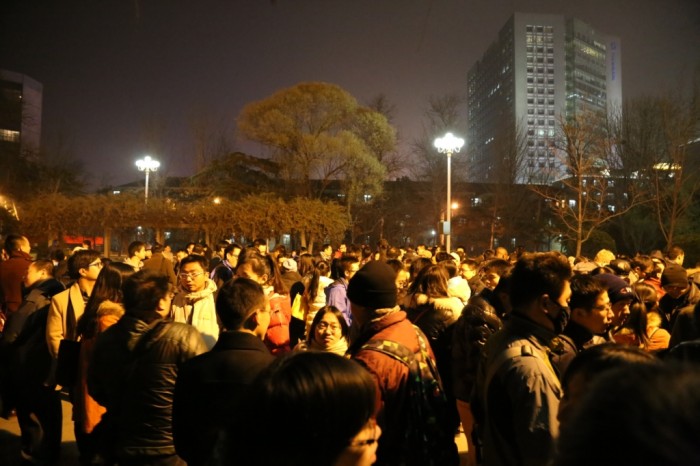
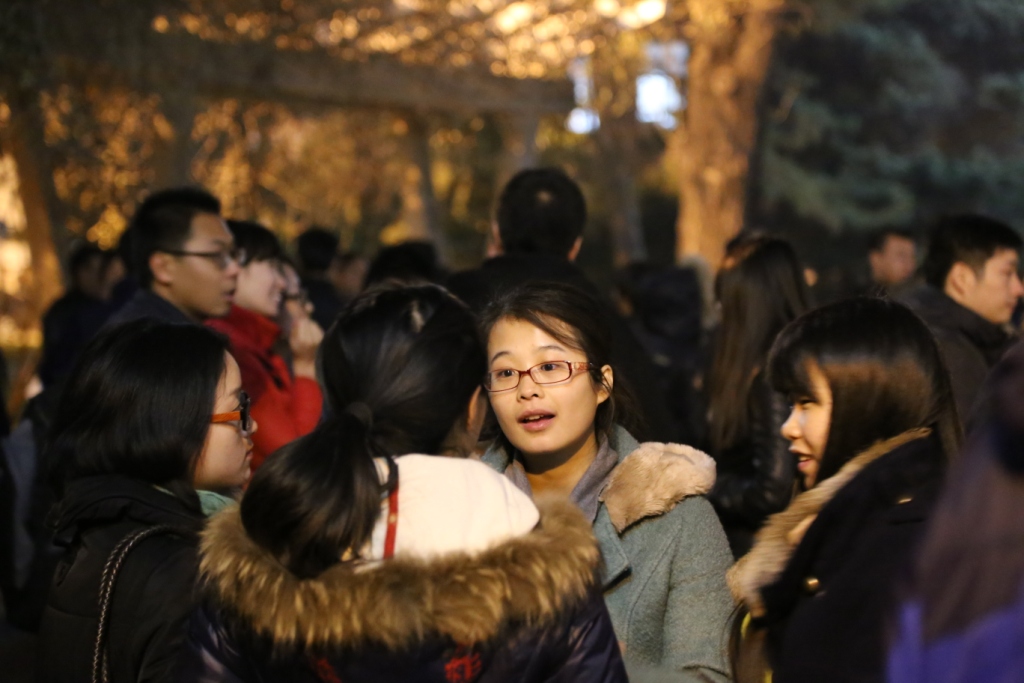

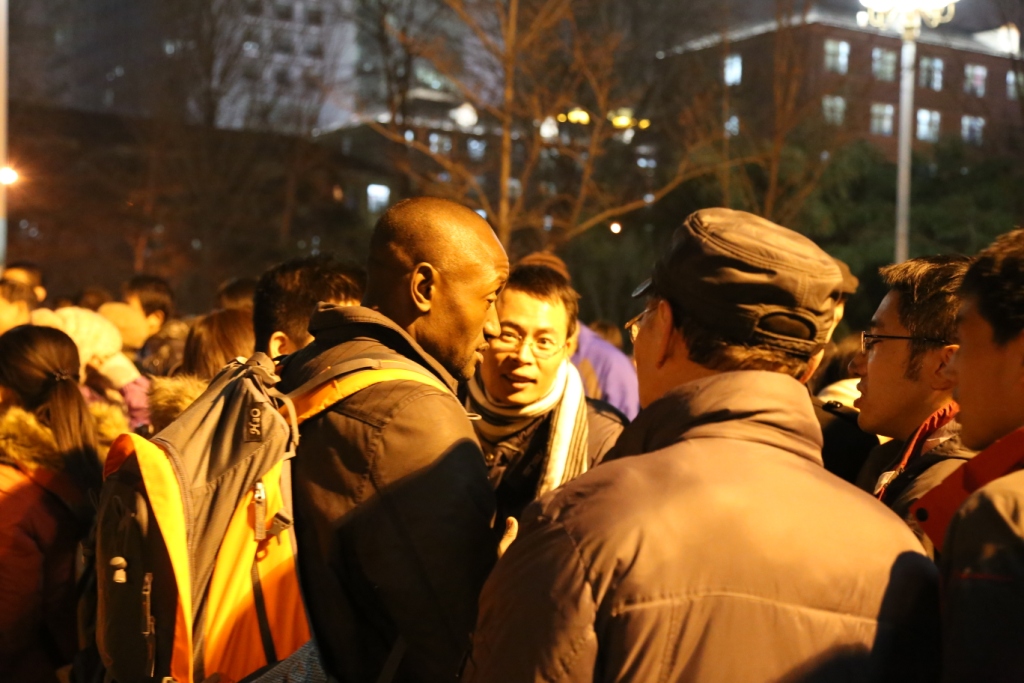
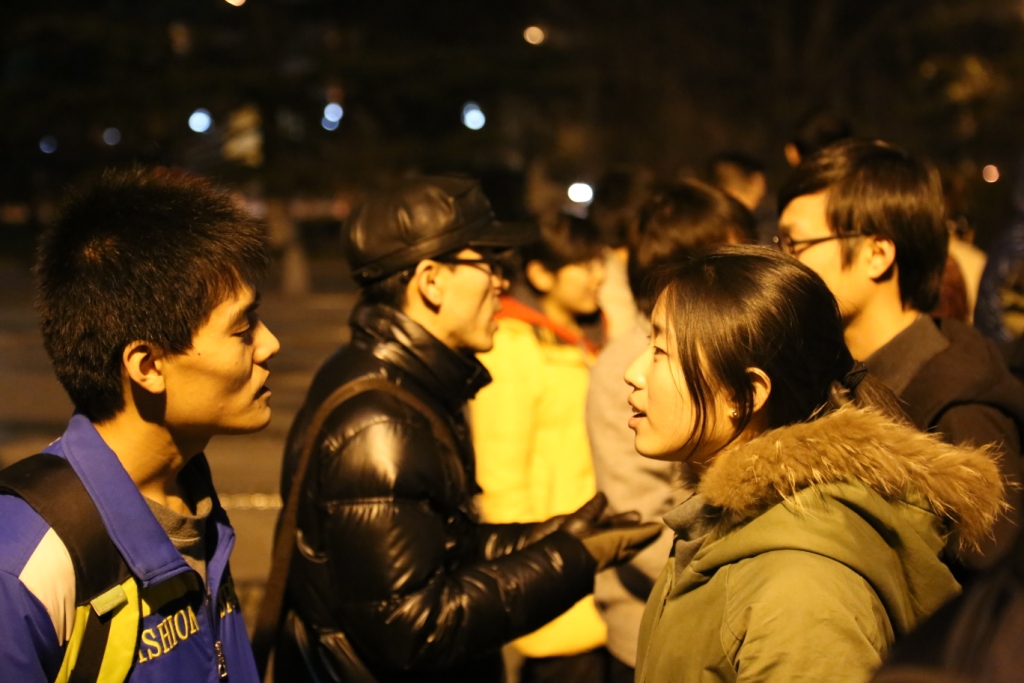
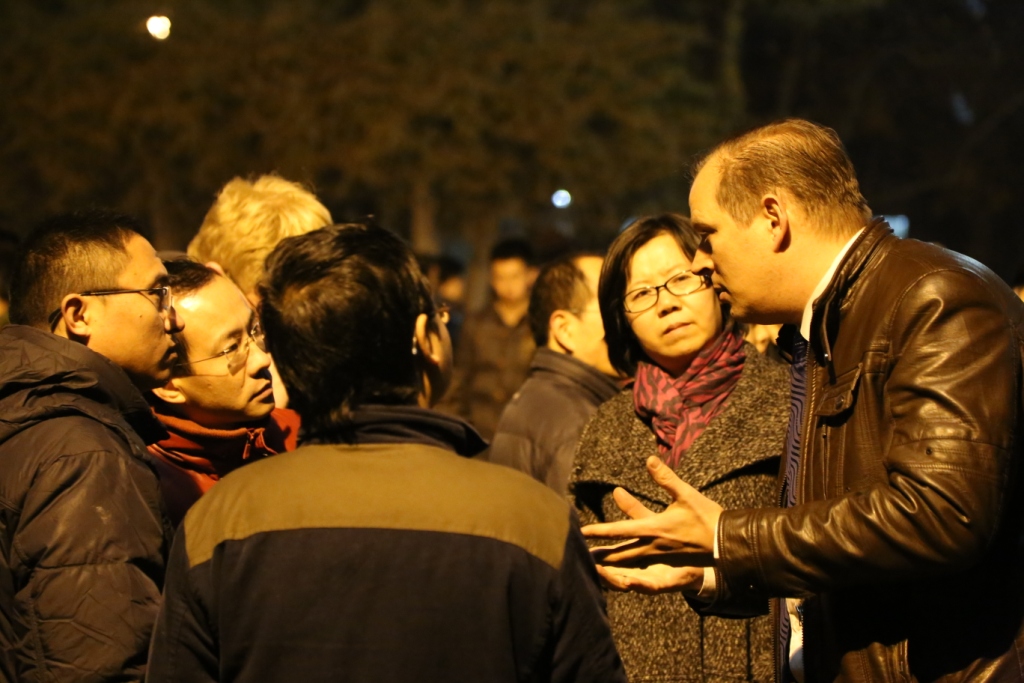
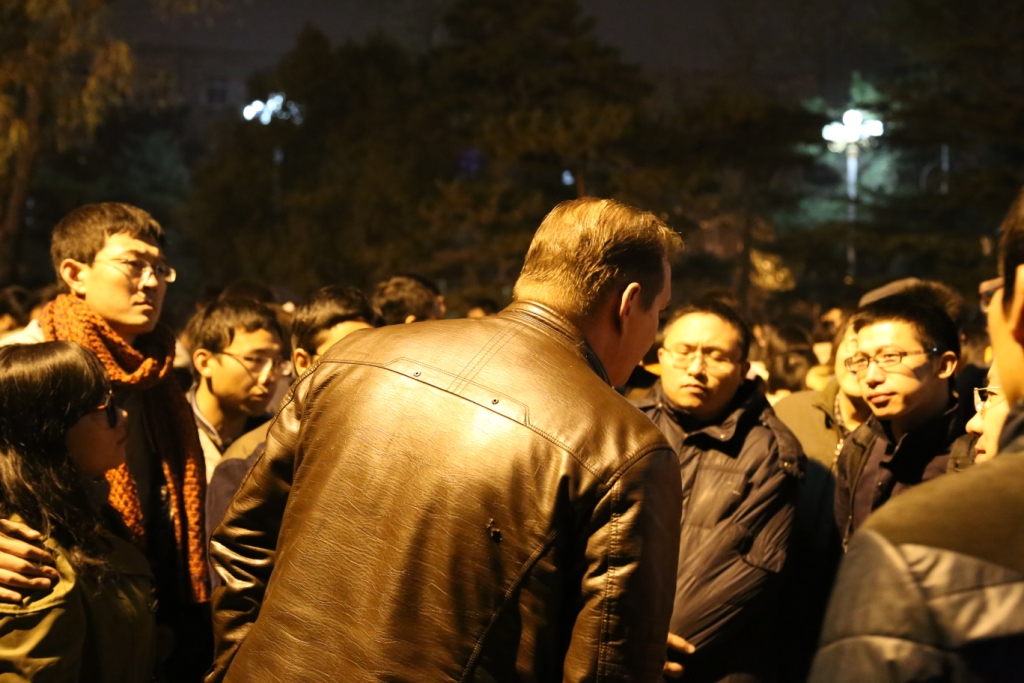
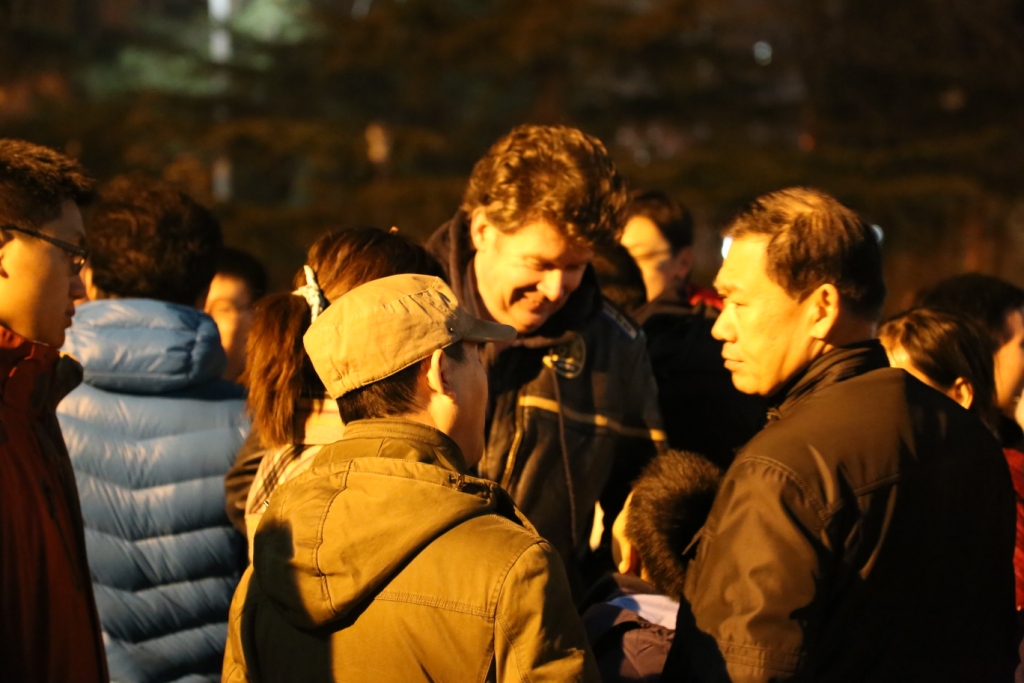
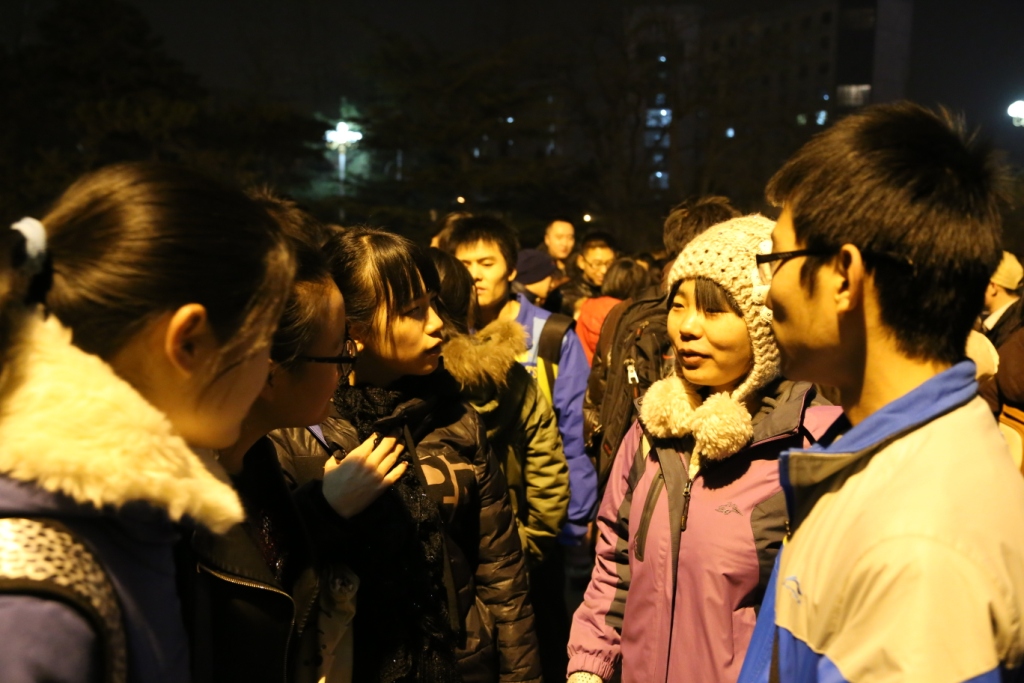

What a interesting article! I’ve heard of English Corners, but didn’t realize they were so entrenched in life there.
I moved to Beijing last week. I’ll check it out!
is english corner still operating in Beijing? will be visisting in July this yr, does anyone know what days/nights it is operational
Lisa, as far as I know, the English Corner is still held every Friday evening at 7pm near the east gate of Renmin University. Once you pass through the gate, walk straight until you see the circular commons.
I would like to apply in the school of journalism
Nice article… I recall English Corner in Shanghai 6 months after T-Square. It was almost an altered state. So intense.
The people had *nothing*… but were hungry to know. Talking about Betty Grable. The revolt in Romania happening that day. Gay culture.
And, decades later, I taught rich Chinese students abroad, who had access to all information, and only wanted to play video games and drive luxury cars.
I know, reductionist… and romantic. A simplistic binary. But, wow… English Corner in 1989… that was something.
The coolest thing on Nanjing Road was a Walkman, and it was hard to find a bar.
Imagine…
George, thank you for sharing that experience. Where in Shanghai was the English Corner held at that time?
Great article. I came across it while fact checking for my memoir. I taught in Beijing in 1985/86 and used to go to the English Corner in Purple Bamboo Park. It was just like you describe. I would be immediately surrounded by people wanting to talk to me. I was in Hong Kong in 1989, watching news reports of the democracy protests, worried for my former students who were probably in Tiananmen Square when the crackdown came.
Perry, do you recall the most common questions you were asked back then? How many people attended English Corner when it was held at the Purple Bamboo Park?
Hi ALECONNER,
I taught for free at Nanjing’s Gulou Park English Corner for a decade, and loved it. One very shy eight year old students, “Laura” became a super star English student winning a big Ministry of Education contest, and getting trips with her parents to Singapore, NZ, Aus, Eng, & Scot. She “made” my teaching career in Nanjing with her win. After that I became a little famous in Nj with parents and students wanting professional lessons by the hundreds. I ended up with a 99% approval rating with a total of about 14,000 students who will be my dear friends for the rest of my life, no kidding.Laura is here: https://www.facebook.com/chalmers.wood/videos/vb.1207532131/10219927252710841/?type=2&video_source=user_video_tab and the “Three Wise Girls here: https://www.facebook.com/chalmers.wood/videos/vb.1207532131/1268535192637/?type=2&video_source=user_video_tab I sent these videos to a friend in the Federal Reserve Bank in Washington DC, and he love them, and that actually helped calm some fears in Washington regarding “The Rise of China”. Enjoy! Chalmers Wood (on facebook)
aleconner, I just saw your question to me from a year ago. I don’t really remember specific questions, but people frequently asked me to judge their pronunciation and accents. Also, people often said that preferred to learn from a Canadian like me because we didn’t have strong accents like people from other countries. I remember being really astounded the first time I went to the English Corner in Purple Bamboo Park because there were probably 100 or more people milling about talking with each other. A few dozen would usually surround me each time I went there.